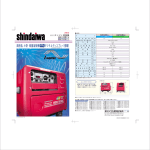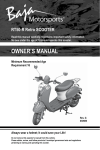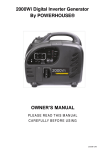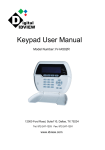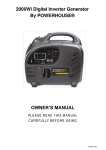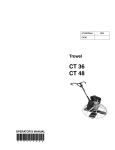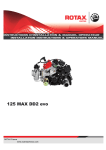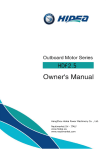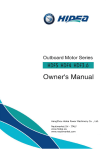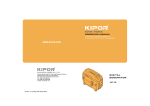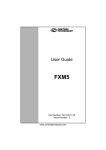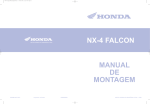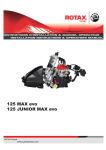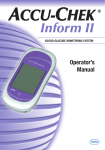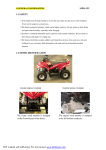Download R`S AND EGW150MCI/UK
Transcript
Table of Contents OWNER’S MANUAL SOUND PROOF PETROL ENGINE R’S AND 1. 2. 3. 4. 5. GENERATOR/WELDER EGW150MCI/UK Air-Cooled, 4 Cycle OHC Engine 6. 7. 8. 9. 10. 11. 12. 13. Page Safety Guidelines Specifications Use Parts Equipment 5-1. Display 5-2. Oil Sensor 5-3. Overload/Overheat Protection Devices 5-4. Eco-Mode(Engine speed control) 5-5. Earth Leakage Circuit Breaker and Grounding 5-6. Wheel Brake Operation 6-1. Initialization /Pre-check 6-2. Starting 6-3. Stopping Welding Operation 7-1. Selection – Welding Cable 7-2. Polarity 7-3. Connection – Welding Cable 7-4. Duty Cycle 7-5. Welding Generator Operation 8-1. Operation 8-2. Output Limitation Simultaneous Use of Welding and Generating Checking and Maintenance Long-term Storage Troubleshooting Wiring Diagram 2 4 5 5 7 7 7 8 8 8 10 10 10 14 15 16 16 16 16 17 17 18 18 18 19 19 23 24 25 CAUTION: Do not operate the Generator/Welder, or any other appliance, before you have read and understood the instructions for use. EGW150MCI/UK X750804-2003 Introduction Thank you for purchasing Shindaiwa Sound Proof Petrol Engine Generator/Welder. This user manual is created to ensure the safe operation of this equipment. Therefore, the manufacturer of this equipment strongly recommends that the user follow the instructions herein, to avoid unnecessary accidents and repairs. Please operate this equipment after thoroughly reviewing and understanding the contents of this operators manual. Please attach this manual, if the equipment is to be on sold or rented out. Please store this manual with the equipment for easy reference. ■Following convention will be used throughout the manual to indicate the degree of cautions. Danger Can cause serious injuries or death. Caution Can cause minor injuries or damage to the equipment or other properties. <Caution> Other types of caution Some of the items noted in [ Caution] may lead to serious injuries. Please read all items and follow all the safety guidelines. The following statement refers to the noise level data contained in the EC Declaration of Conformity attached to this manual “The figures quoted are emission levels and are not necessarily safe working levels. Whilst there is a correlation between the emission and exposure levels, this cannot be used reliably to determine weather or not further precautions are required. Factors that influence the actual level of exposure of work-force include the characteristics of the work place, the other source of noise etc. i.e. the number of machines and other adjacent processes, and the length of time for which an operator is exposed to the noise. This information, however, will enable the user of the machine to make a better evaluation of the hazard and risk” -1- 1. Safety Guidelines Danger: Suffocation from exhaust fumes Exhaust fumes from the engine contains many elements harmful to humans. Do not operate equipment in poorly ventilated areas, such as inside a room or in a tunnel. Danger: Electric Shock Do not touch the equipment, if equipment or you are wet. Do not insert metal objects (such as pin or wire) into plug-in receptacles. Do not touch wiring or electric parts inside the equipment during operation. Before connecting or disconnecting a welding cable from output terminal, stop the engine, and remove the key. Before performing any equipment check or maintenance, stop the engine and remove the engine key. The person performing the check or maintenance should always keep the key. Caution: Suffocation from exhaust fumes Do not point the exhaust fume outlet pipe in the direction of pedestrians or building. Caution: Suffocation from welding fumes Be sure to wear a fume proof mask during operation, as welding fumes contain poisonous gases and dust. Pay attention to the airflow direction and ensure sufficient ventilation also in order to prevent inhalation of the fume. Caution: Injuries to eyes and skin Be sure to wear spark protection glasses/mask long-sleeve shirts, gloves, etc. in order to protect and skin from harmful sparks during welding. Battery fluid contains diluted sulphuric acid. Avoid contact with eyes, skin and clothing. If the acid comes in contact with eyes, flush with lots of water, and contact to your physician immediately. Caution: Electric shock Do not flush water onto the equipment or operate it in the rain. This machine is rated to IP23. Do not touch a spark plug, plug cap or high-voltage wiring during operation. Caution: Explosion Do not use the equipment or charge the battery, when the battery fluid level is below the LOWER level marker. The battery may emit some combustible gas. Keep it away from fire and sparks. Caution: Fire The equipment uses Unleaded Petrol as a fuel. When inspecting the equipment or refueling, always stop the engine and keep away from sparks or naked flames. Always wait until the engine cools down before refueling. Always wipe away any drips of fuel or lubrication oil. Do not use this equipment if a leak is found. Repair the equipment before use. Temperatures around the muffler and exhaust can get extremely high. Keep any inflammable items (such as fuel, gas, paint, etc.) away from the equipment. Keep any inflammable items and combustible items away from the welding area, -2- as welding creates hot sparks. Always operate this equipment on flat surface and, with at least 1 metre clearance from all objects. Do not connect AC output to any indoor wiring. Always wait until the equipment cools down, before covering for storage. Keep children at a safe distance from the machine at all times. Caution: Burns Do not touch the engine and muffler during operation and immediately after stopping the equipment, as temperatures can reach extremely high levels. When checking engine oil or changing oil, always stop the engine, and wait until the engine cools down. Do not open the oil gauge/oil filler cap during operation, as hot oil may cause injury. Be sure to wear leather gloves, apron, shoe covers, eye protection glasses/mask, safety shoes, safety cap, and long sleeve shirts, to protect from sparks. Caution: Injuries When lifting the equipment, always use the top mounted lifting lug. Do not lift using the positioning handles. Always use appropriate lifting gear and secure adequately during transportation. Always place the equipment on a flat and stable surface and fix wheels using the brake, to prevent equipment movement. When stating the engine, turn off all connected equipment and set the AC output switch to the OFF position. Do not move the equipment during operation. When performing equipment checks and maintenance, always stop the engine. Do not operate the equipment, if the equipment is faulty or if there are missing parts. ① ② ③ ④ ⑤ Location of Warning labels When the warning labels become unreadable or damaged, place new labels on the appropriate locations, as specified in the following figure. When ordering the label, use the following part numbers. Suffocation from exhaust fumes (No.X505-006400) High Voltage (No.X505-005080) Positioning handle (No.X505-006430) Hot surface (No.X505-006420) Electric Shock (No.X505-004930) ① ④ ③ ⑤ ② -3- 2. Specifications Engine AC Generator Welding Generator Model Generating Method Rated Current (A) Duty Cycle (%) Rated Speed (min-1) No Load Voltage (V) Current Adjustable Range (A) Welding Rod (φ) Phase Rated Voltage (V) Frequency (Hz) Rated Speed (min-1) Rated Output (kVA) Rated Current (A) Power Factor Rating Model Type Displacement (L) Rated Output (kW/min-1) Fuel Lubricant Oil Lubricant Oil Volume (L) Starting Method Spark Plug Battery Fuel Tank Capacity (L) Dimension L x W x H (mm) Dry Weight (kg) EGW150MCI/UK Rotating Field, Synchronous AC Generator 140 50 3600 MAX 75 40-155 2.0-3.2 1-Phase 110 50/60 3400 2.5 23 1.0 Continuous Robin EX27DS Air-cooled, 4-Cycle OHC Gasoline 0.265 5.1/3600 Unleaded Petrol API Class SE or higher 1.0(about) Recoil Start and Starter Motor NGK BR6HS Yuasa YTX9-BS or 34A19L 12 706 x 494 x 625 79 GENERATING SET ISO 8528-8/G2 EMC Group 2 Class A -4- 3. Use Arc welding Power source for electric tools Power source for lights Voltage classification G2 EMC Classification Group 2 Class A Caution: Damage to the equipment or other properties Consult with our dealer or authorized distributor when utilizing this equipment around the devices with the microcomputer control or the ultra-precision items, which are very sensitive for the voltage fluctuation. Keep the equipment away from those devices to avoid any influence from electromagnetic noise. Consult with hospital or medical equipment companies before using this equipment on medical apparatus. It is recommended you follow this instruction manual strictly, to avoid unnecessary accidents, repairs and damage. 4. Parts 1. AC Output Receptacle (16A) 2. AC Output Receptacle (32A) 3. Earth Leakage Circuit Breaker (ELCB) 4. AC Output Switch 5. Frequency Changeover Switch 6. Display 7. Current Adjusting Dial 8. Idle Control Switch 9. Starter Switch 10. Choke 5 ○ 6 ○ 18 ○ 7 ○ 11. 12. 13. 14. 15. 16. 17. 18. 19. 20. 21. Welding Output Terminal Battery Earth Grounding Terminal Oil Gauge/Oil Inlet Oil Drain Plug Fuel Lever Top-Mounted Lifting lug Fuel Inlet Front Door Wheel Plug Cap (Spark Plug) 17 ○ ○ 10 ○ 8 9 ○ 11 ○ 4 ○ 21 ○ 3 ○ 19 ○ 2 ○ 1 ○ 12 ○ 13 ○ 14 ○ 15 ○ -5- 20 ○ 16 ○ 22. 23. 24. 25. 26. 27. 28. Positioning Handle Air Cleaner (Cleaner Cover) Recoil Knob Muffler ( with Exhaust Wire Mesh) Exhaust Outlet Wheel Brake Side Door 25 ○ 26 ○ 22 ○ 28 ○ 23 ○ 24 ○ 22 ○ 27 ○ -6- 5. Equipment 5-1. Display This equipment has multi display which indicates operation status on the control panel, while the engine is running. (1) Digital hour meter Total operation hours will be indicated for 5 seconds only, after the engine has started. Then the display will alternate between pre-set/actual welding current. (Maximum indication up to 9,999hours) (2) Welding current (pre-set/actual) Default display mode indicates pre-set welding current. (The pre-set welding current lamp turns on.) The display indicates actual welding current while welding. (The actual welding current lamp turns on.) (3) Oil warning If the engine oil sensor has activated during operation, the display will indicate [OIL]. Please refer to Oil Sensor (P7). (4) Over load warning When the AC output current exceeds the machine rating, the display will indicate [OC]. Please refer to Overload/Overheat Protection Devices (P8). (5) Over heat warning When extreme high temperature is detected at the inverter circuit, the display will indicate [OH]. Please refer to Overload/Overheat Protection Devices (P8). 5-2. Oil Sensor Caution: Burns When checking engine oil, always stop the engine, and wait until the engine cools down. Do not open the oil gauge/oil filler cap during operation, as hot oil may cause injury. Caution: Injuries When re-starting the engine in order to check oil sensor activation, turn off the connected equipment and set the AC output switch to OFF position. If the engine oil sensor is activated during operation, the display of the control panel will indicate [OIL], and the automatic shutoff will be engaged in order to protect engine from failure, which is the function of oil sensor unit. After the engine stops, the display on the control panel shows OFF. You should check the engine oil level, and replenish to the maximum level if needed. Please refer to Checking Engine Oil (P10). <Caution> The engine oil sensor cannot detect the degradation of engine oil. Please check the engine oil periodically, and change if required. Refer to Change Engine Oil (P20). -7- 5-3. Overload/Overheat Protection Devices Caution: Injuries Be sure to turn off the connected equipment before restarting the engine after the overload and/or overheat protection devices are activated. This device is designed to protect the welding machine by tripping the circuit output when overload or extreme temperatures are detected in the inverter circuit. Display will indicate the following abbreviations when the device is activated. [OC]: Over load (over current) [OH]: Over heat (extreme high temperature at inverter circuit) Follow the below instruction below to reset the device after the protection has been activated. ① Shut off any connected equipments and turn off the AC output switch. ② Allow the unit for cool down during idling mode for a minimum of five minutes. ③ Shut off the engine. ④ Turn the engine on again, and then turn on the AC output switch. <Caution> Refer to Output Limitation (P18) for a table showing maximum currents from the circuit. There is no automatic shut off function with AC output switch. Insufficient air cooling may cause Overheating [OH]. 5-4. Eco-mode (Engine revolution control) The Eco mode is designed to control the engine speed based on the required current to minimize the noise level and fuel consumption. Turn the Idle control switch to [Eco] position to use this function. (1) Welder When welding current output is detected, the engine turns to appropriate speed and returns to idling rpm approximately 8 seconds from welding has finished. (2) Generator While utilizing AC output, the engine turns to appropriate speed and returns to idling rpm when not utilizing AC output. [High] mode will always turn the engine to high rpm. <Caution> Always select [High] mode while utilizing high load equipment to ensure constant output. 5-5. Earth Leakage Circuit Breaker and Grounding Danger: Electric Shock Ground the grounding terminal to the earth as set out in the manual. Failure to do so could result in injury. Even though all the load terminals have been grounded to the earth, the canopy grounding terminal should also be grounded to the earth. Grounding should be made whilst the engine is stopped. Whenever the earth leakage relay has activated, you should always repair the fault before re-using the machine. -8- The equipment is provided with an Earth Leakage Relay (ELR) within the Main Circuit Breaker (MCB) to detect any earth leakage due to problems such as insulation failure of the load whilst the generator is running. When activated, the ELR will automatically switch the MCB to the OFF position. The specifications of the earth leakage relay: Rated Sensitive Current: 30mA (or below) (Grounding resistance: 500Ω or below) (1) Grounding Work A qualified electrician should perform the grounding work at the 2 points as shown below. (500Ω or below) The grounding terminal of this equipment GROUNDING TERMINAL The Outer Casing of the load <Caution> In the event you cannot ground the GROUNDING ROD generator to the earth, consult with the authorized distributor or our dealer. (2) Operation Check Before operating the equipment, follow the instructions below. ①Start the engine as per starting procedure. Please refer to Starting (P14). ②Turn the AC output switch to [ON]. ③Switch the ELCB (lever) to the [ON] position. ④Press the test button (Gray color) in the ELCB. (Once the test button is pressed, the ELCB indicator (White) must be out and the switch will be moved in between [ON] and [OFF]). ⑤Push down the ELCB (switch) [OFF]. ELCB ⑥Return the ELCB (switch) to [ON] position. ELCB INDICATOR (The ELCB indicator (white) will be return to its original position. In the event you cannot complete all 6 steps in the above procedure, the ELCB is faulty. Consult with our authorized distributor or our dealer. TEST BUTTON ⑦Be sure to set the AC output switch position to [OFF] before starting the engine. (3) The Earth Leakage Relay has activated Caution: Electric Shock/Injuries Be sure to disconnect all the loads to the equipment before turning the ELCB ON again, after the earth leakage relay has activated. When the Earth Leakage Relay has activated, the ELCB indicator button (White) will be out and the ELCB (switch) will have moved to the position in between [ON] and [OFF]. In this case, stop the engine and find the earth leakage fault and repair. After repairing leakage fault, reset the ELCB using the following procedure. Push the ELCB switch down to [OFF]. Lift the ELCB switch to return to the [ON] position. -9- <Caution> If the ELCB indicator button is not out, the AC Output current may have over supplied. Please refer to Output Limitation (P18) for the table showing maximum currents from the circuit. After disconnecting all the loads to the equipment, reset the ELCB once more. 5-6. Wheel Brake Caution: Injuries Be sure to place this equipment on a flat surface and lock the wheel by lifting the brake arm as shown below. The wheel Brake is designed to lock the wheel to avoid unnecessary movement of the equipment when operating on the flat surface. It is recommended you secure additional brake and/or ropes to fix the position during transportation or when operating the machine on uneven ground. (1) Lock the wheel ① Lift the brake arm upward to position 1 ② Gently lock the equipment to slide the brake arm to position 2 with a clicking noise ③ Confirm the equipment is now locked. (2) Unlock the wheel Slide the brake arm to position 1 and then default position 1 <Caution> Be sure to unlock the brake, before attempting to move the equipment to avoid a locking system malfunction. LOCK 2 1 UNLOCK 1 2 6. Operation 6-1. Initialization /Pre-check Caution : Fire・ ・Burns・ ・Injuries When checking the equipment, always stop the engine and wait until the engine cools down. Never place the equipment close to inflammable products. Maintain a minimum clearance of 1 metre around the equipment. (1) Checking Engine Oil Insert the oil gauge into oil inlet to check the engine oil level (Do not screw the oil gauge into the oil tank), whilst positioning the equipment on a flat and stable surface. Before operation, ensure oil level is to the UPPER level. Oil Capacity: approximately 1 litre (maximum) Effective Oil Volume: about 0.5 litre (between the LOWER and UPPER) <Caution> You cannot measure the oil level accurately when the equipment is on an uneven surface. If the machine is placed on an uneven surface, it is still possible for the engine to - 10 - run, however the oil sensor may not detect accurately the true level of oil and this may cause engine failure. UPPER LEVEL LOWER LEVEL FRONT DOOR OIL GAUGE FUEL LEVER OIL GAUGE OIL DRAIN PLUG Engine Oil Selection Use engine oil with the correct viscosity, based on the ambient temperature (refer to the chart). <Caution> Use the oil of Class SE or superior. Check the remaining oil level more frequently when using multi-grade type oil, as the oil consumption rate increases under high ambient temperature. Oil Selection Criteria 10W 20W Single #20 Grade #30 #40 Multi Grade Ambient Temperature 10W-30 -10 0 10 20 30 40 ℃ 14 32 50 68 86 104 (2) Checking Fuel Caution: Fire Always wipe away any drips of fuel or oil. Check the fuel level and add fuel if necessary. <Caution> Replace the fuel when the equipment has not been used for 2 months or more. Use unleaded petrol only. Keep or turn the fuel lever to CLOSED position beforehand when filling fuel. Be sure to use the fuel filter net when filling. Never fill fuel above the UPPER level. Never smoke whilst refueling. [OPEN] ] LEVEL MARK FUEL LEVER [CLOSE] ] FUEL STRAINER NET - 11 - (3) Checking Fuel or Oil Leakage Caution: Fire Do not use the equipment if a leak is found. Repair the equipment before use. Open the front door to check for any fuel leaks or oil leaks at the hose connection. When checking for fuel leaks, OPEN the fuel lever. <Caution> Tighten the fuel strainer ring securely in order to prevent any fuel leakage. RING FUEL STRAINER (4) Checking Battery Caution: Injuries to eyes and skin The battery used in the equipment is the sealed type 12V. Therefore, it is not necessary to check the liquid level and replenish water. Do not remove the sealed plug. Battery fluid contains diluted sulphuric acid. Avoid contact with eyes, skin or clothing. If the acid comes into contact, with eyes, flush with lots of water, and seek medical attention immediately. Caution: Explosion While utilizing sulphuric acid type battery [34A19L], be sure not to use or recharge the battery if the fluid level is lower than the lowest limit. Battery may emit some combustible gas; therefore keep it away from flames or sparks. ① Open the front door. ② Make sure that the battery cables are firmly secured to the posts. Tighten the clamps if necessary. <Caution> Check and measure the voltage between terminals. If it is lower than 12.8V, recharge is necessary. BATTERY FIXING PLATE Rubber Band - 12 - Replacing battery ① Remove the clamp and the cable from the negative (-) post in the battery. (Always remove negative side first.) ② Remove the clamp and cable from the positive (+) post on the battery. (Never touch the battery fixing plate to the terminals) ③ Remove the battery fixing plate from the battery. (Never touch the battery fixing plate to the terminal) ④ Pull out the battery. (Never touch the terminals to the equipment body) ※ Reinstall a new battery in reverse order. (Always attach the cable to the positive (+) post on a battery first.) <Caution> Use the following battery. Yuasa YTX9-BS or 34A19L Replacing battery for sulphuric acid type battery 34A19L ① Remove the sealed battery as per above procedure. ② Remove the rubber band which is securing fuel hose and battery positive (+) cable ③ Remove the fixing bolt on the left side of the battery by loosening the nut, and then place the bolt on the bolt hole on the back side. (Fig.A) ④ Remove the fixing bolt on the right side of the battery and place the bolt on the hole of the right bottom. (Fig.A) ⑤ Install the sulphuric acid battery [34A19L] into the battery space. ⑥ Insert the battery fixing plate on the bolt as shown Fig B and tighten the wing nuts. ⑦ Be sure to connect the positive (+) cable first to the positive terminal to avoid unnecessary sparks. ⑧ Next, connect the negative (-) cable to the negative terminal. ⑨ Attach the fuel hose and battery positive (+) cable to the battery fixing bolt by rubber band. (Fig.C) FIXING BOLT BATTERY FIXING PLATE Fig.A Position of the Fixing Bolt Fig.B Direction of the Fixing plate Inspection of the sulphuric acid type battery 34A19L ① Open the front door ② Check the fluid level. If the level is near or lower than lowest level, add distilled water within the upper level. ③ Make sure that the battery cables are securely tightened to the terminal. Retighten the clamps if necessary. - 13 - RUBBER BAND Fig.C Completion TERMINAL LOWER LEVEL UPPER LEVEL <Caution> Check the gravity of the battery fluid. If it is under 1.23, the battery requires recharging. Please consult with our dealer or authorized distributor. 6-2. Starting Danger: Suffocation from exhaust fumes Exhaust fumes from the engine contains many elements harmful to humans. Do not operate this equipment in poorly ventilated areas, such as inside a room or in a tunnel. Caution: Suffocation from exhaust fumes Do not point the exhaust fumes toward pedestrians or building. Caution: Fire Temperatures around the muffler and exhaust can reach extremely high levels. Keep inflammable items (such as fuel, gas, paint, etc.) away from the equipment. Always operate this equipment on a flat surface and, at least 1 metre clearance from any objects. Caution: Injuries Always place the equipment on a flat and stable surface and fix wheels with brake, to avoid the equipment from sliding. When starting the engine, turn off the connected equipment and set the AC output switch to OFF position. Total operation hours will be indicated for 5 seconds only, after the engine has started. Then the display will be automatically changed to pre-set welding current. (The pre-set welding current lamp turns on.) (1) Starting by Starter Motor ELCB CHOKE STARTER SWITCH FRONT DOOR AC OUTPUT SWITCH OIL GAUGE FUEL LEVER OIL DRAIN PLUG ① Select the AC output to OFF. ② Open the front door and turn the fuel lever to OPEN. ③ Pull out the choke. ④Turn the starter switch to START. The starter motor starts and then the engine starts. <Caution> Do not keep the starter motor ON for more than 5 seconds. When restarting, wait for 30 seconds or more ④ When the engine starts, release the starter switch key immediately. <Caution> Never turn the starter switch to START once the engine is running. ⑤ Push back the choke. - 14 - <Caution> Just after starting, the engine may stop if the choke is prematurely pushed back in. In this case, push back the choke slowly once the engine is warm. ⑥ Keep engine idling for approximately 5 minutes. (2) Starting by Recoil Starter ELCB CHOKE STARTER SWITCH CLEANER COVER RECOIL KNOB SIDE DOOR AC OUTPUT SWITCH ① ② ③ ④ ⑤ Switch the AC output switch to OFF. Open the front door and turn the fuel lever to OPEN. Pull out the choke. Turn the starter switch to RUN. Pull the recoil knob slowly to the compression point, and then allow the recoil knob to return and pull it again to start. <Caution> Do not fully extend the recoil knob. ⑥ After the engine starts, push back the choke. <Caution> Just after engine starting, the engine may stop if the choke is prematurely pushed back in. Therefore, push back the choke slowly along the engine condition and keep the choke back always when the engine is warm. ⑦ Keep engine idling for approximately 5 minutes. 6-3. Stopping ELCB CHOKE STARTER SWITCH FRONT DOOR OIL GAUGE AC OUTPUT SWITCH ① ② ③ ④ ⑤ FUEL LEVER OIL DRAIN PLUG Switch the AC output switch to OFF. Turn the idle control switch to ECO. Keep the engine idling for approximately 3 minutes to cool. Turn the starter switch to STOP. After the engine stops, open the front door and turn the fuel lever to CLOSE. - 15 - 7. Welding Operation 7-1. Selection – Welding Cable Ensure adequate lighting is available. If ambient light is insufficient, use additional lights. Select the correct cable, based on the allowable amperage and distance as per the table shown below. The welding capacity is reduced if too small gauge cable is used. <Caution> Welding cables should be used uncoiled. When the welding cables are used in coiled, welding capacity is reduced. Correct size of cable (Unit: mm2) Return Length 20m 30m 40m 60m 80m 100m Welding Current 140A 22 22 22 38 50 60 100A or below 22 22 22 22 30 38 7-2 Polarity There are two welding output terminal, [+] and [-]. Select the polarity according to the operation, referring to the table below. <Caution> Follow the instruction on the welding rods, the polarity will be specified. Normal Polarity Reverse Polarity Application Generals Welding, such as construction Thin plate, Build-up Welding Stainless Steel Connection [-]Minus to holder (Rod) [+]Plus to the Earth (Material) [-]Minus to the Earth (Material) [+]Plus to holder (Rod) 7-3. Connection – Welding Cable Danger: Electric Shock Always examine welding cables, power cables and plugs etc., to ensure there are no defects present, prior to operation. Before connecting or disconnecting a welding cable from welding output terminals, stop the engine, and remove the engine key. The person performing this task must always keep the key. ① Stop the engine. ② Connect a welding cable to the DINSE connectors, a welding rod holder and a material holder. WELDING ROD HOLDER WELDING CABLE MATERIAL HOLDER - 16 - DINSE CONNECTORS <Caution> Always fit the correct size DINSE connectors. ( Recommended parts:DIX SK 35 or DIX SK 50 or DIX SK 70) Ensure the welding cables connections are made correctly. Be sure to connect the welding cables securely to welding output terminals. Welding output terminals may burn due to the heat caused by poor connections. Do not use a cable without the DINSE connectors. Personal injury or damage to the machine may result as a consequence. 7-4. Duty Cycle Duty cycle means the welding time ratio for 10 minutes. The duty cycle of the equipment is 50%, namely, the welding time is 5 minutes or less in continuous 10 minutes of welding time. Be sure to take 5 minutes break after each 5 minutes of continuous welding time. <Caution> The equipment may become damaged due to overheating, if continuous welding periods exceed 5 minutes or if break period is reduced. This machine produces drooping characteristics to EN60974-1. 7-5. Welding Caution: Suffocation from welding fumes Be sure to wear a fume proof mask during operation, as welding fumes contain poisonous gases and dust. Pay attention to the airflow direction and ensure sufficient ventilation in order to prevent inhalation of the fume. Caution: Injuries to eyes and skin Be sure to wear spark protection glasses, long-sleeve shirts, gloves, etc. in order to protect eyes and skin from harmful sparks during welding. (Refer to the table below) Light Shielding Standard Glass Light Shielding Degree No. Welding Current (A) 7 8 30-75 9 10 76-200 11 12 13 201-400 Caution: Fire Keep any inflammable items and combustible materials away from the welding area. Caution: Burns Be sure to wear leather gloves, apron, shoe covers, eye protection glasses /mask, safety shoes, safety cap and long sleeve shirts, as welding creates hot sparks. ① Start the engine. ② Adjust the current by the current adjusting dial. Be sure to check the preset welding mode lamp turns on. Rotate the current dial to desired preset welding current as indicated on the display. ③ After striking welding arcs, display indicates actual welding current and the actual welding lamp illuminates. - 17 - 8. Generator Operation Danger: Electric Shock Do not operate the equipment, if the equipment or you are wet. Caution: Injuries Be sure to connect to the receptacles, after confirming that all the switches on the loads are set to the [OFF] position. Always examine welding cables, power cables and plugs etc., to ensure there are no defects present, prior to operation. Do not connect the equipment to any power supply network. Extra precautions must be taken whenever performing more hazardous welding operations such as: - Environments with increased risk of electric shock, for example due humidity or conductivity; - Inflammable surroundings and/or atmospheres; - Inflammable products; - Closed containers; - Elevated working positions or platforms. Caution: Damage to the equipment or other properties Consult with our dealer or authorized distributor when utilizing this equipment on devices with microcomputer control or the ultra-precision items, which are very sensitive to voltage fluctuation. Keep the equipment away from those devices to avoid any influence from electromagnetic noise. Consult with hospital or medical equipment company before using this equipment on medical apparatus. It is recommended to follow this instruction manual strictly, to avoid any unnecessary accidents, repairs and damage. Voltage classification G2 EMC Classification Group 2 Class A Do not use this equipment for the purpose of thawing pipes. If utilizing this equipment in conditions where altitude, ambient temperature and/or humidity is higher than the reference conditions, a reduction in power may be necessary.. - 18 - <Caution> Single phase AC output from the 32Amps and 16Amps sockets are as follows. ① 110V, 16A ② 110V, 23A Total current should be limited within the rated current specification. The rated current for this equipment : 23A/50Hz (23A/60Hz) ② ① 8-1. Operation ① Set the frequency. 50Hz: Turn the frequency changeover switch to [50Hz]. 60Hz: Turn the frequency changeover switch to [60Hz]. ② Turn the AC Output Switch to [ON]. ③ Turn the ELCB to [ON]. 8-2. Output Limitation Please refer to the following table. Electric tools and home appliances cannot be judged only by the rated output or the power consumption due to the efficiency and character of the components. Applicable Load (For reference only) Capacity (Watt) Load High Speed Low Speed 50Hz 60Hz Electric Bulb, Heater, etc. 2500 2500 Electric Tools (Series Motor), etc. 1200 1200 Mercury Bulb (High Power Factor Type) 1000 1000 Submersible Pump, Compressor, etc. (Induction Motor) 1000 1000 <Caution> Be sure to use correct frequency for mercury bulbs and induction motors. The start load may require more power than the rated power. Consult with our authorized distributor or our dealer to clarify. When using both sockets, start the load one by one, and not simultaneously. Be sure not to exceed the rated current. 9. Simultaneous Use of Welding and Generating Refer to the following table and limit the AC power use. Limitation of AC Power Supply in the simultaneous use of welding and generating Welding Output AC Output Welding Rod/Amperage 50/60Hz 2.6mm/100A 0.2kVA or below 3.2mm/120A <Caution> While utilizing AC single phase output when welding, be sure to keep the welding current less than 100A to avoid fluctuation or insufficient AC output. - 19 - 10. Checking and Maintenance Danger: Electric Shock Before performing any equipment check or maintenance, stop the engine and remove the engine key. The person performing the check or maintenance should always keep the key. Caution: Fire・・Burns Never close the equipment to fire. When checking the equipment, always stop the engine and wait until the engine cools down. To optimize the use of this equipment, we recommend periodical checks and maintenance, as per the following maintenance matrix. <Caution> Request for the maintenance items with ● mark to the authorized distributor or our dealer. Checking item Startup 1 Check and Supply Engine Oil ○ 2 Check Water in Battery ○ 3 Check Leakage Fuel/Engine Oil 4 Engine Oil Change 5 Clean Fuel Strainer 6 Clean/Change Air Cleaner Every Every Every Every 12 50hrs 200hrs 500hrs months ○ st 1 ○ 2nd ○ (20 hrs) 7 ○ Clean/Adjust Spark Plug ○ ○ (Clean) (Change) ○ ○ (Clean) (Adjust) 8 Clean Exhaust Wire Mesh ○ 9 Overhaul ● 10 Check Carbon Brush ● 11 Check/Adjust Engine Valve Clearance 12 Clean Fuel Tank/Fuel Strainer ● 13 Change Fuel Pipe ● 14 Change Vibration-Absorbing Rubber ● ● <Caution> Use always the genuine part. - 20 - (1) Change Engine Oil First Time 2nd or after 20 hour mark Every 50 hours ① ② ③ ④ Remove the oil gauge. Loosen the oil drain plug and allow the oil drain fully. Reinstall the oil drain plug. Checking the oil level by the oil gauge, add oil into the oil fill up to the max level. (approximately 1.0 Liter) ⑤ Reinstall the oil gauge hand tight. FRONT DOOR UPPER LEVEL LOWER LEVEL FUEL LEVER OIL GAUGE OIL GAUGE OIL DRAIN PLUG (2) Clean/Adjust Spark Plug Clean Adjust Every 50 hours Every 200 hours ① Remove the plug cap and remove the spark plug off by spark plug wrench. ② If the spark plug is dirty, wipe out the dirt by using a spark plug cleaner or wire brush. ③ Adjust the opening to 0.6-0.7mm between the electrodes. <Caution> Use the plug of <NGK BR6HS>. GAP 0.6mm to 0.7mm (0.024in to 0.028in) PLUG CAP (3) Clean Air Cleaner <Caution> Clean more frequently, if used in dusty environment, Clean Adjust Every 50 hours Every 500 hours ① Remove the cleaner cover. ② Clean the urethane part in kerosene. And then dip it into liquid of 3 parts kerosene: 1 part engine oil and squeeze it tight. - 21 - CLEANER COVER CLEANER COVER RECOIL KNOB SIDE DOOR URETHANE PART (4) Clean Fuel Strainer Clean ① ② ③ ④ ⑤ ⑥ ⑦ Every 200 hours Open the front door. Turn the fuel lever to [Close]. Unscrew the bolts. Pull out the fuel lever. Remove the strainer cup by turning the ring counter-clockwise. Discard any dust or water inside the strainer cup, and clean away dust from the net. Reassemble, and be sure to screw tightly to prevent leaks. <Caution> Be sure to remove any contaminants on the seal, whenever reassembling the strainer cup. Turn the fuel lever to [OPEN] after assembling, and check for any leaks. FUEL LEVER NET [OPEN] ] PACKING BOLT FUEL LEVER [CLOSE] ] STRAINER CUP STRAINER CUP RING (5) Clean Exhaust Wire Mesh Clean Every 500 hours ① Loosen the bolt and remove the exhaust wire mesh and holder. ② Clean up the carbon deposit from the exhaust’s wire mesh using wire brush. EXHAUST WIRE MESH HOLDER - 22 - 11. Long-term Storage Danger: Electric Shock Before performing any equipment check or maintenance, stop the engine, and remove the engine key. The person performing the maintenance should always keep the key. Caution : Fire・ ・Burns When checking engine, always stop the engine, and keep away from fire. Temperatures around the muffler and exhaust can get extremely high. Wait until the engine cools down, before performing any checks. If the equipment is not to be used for more than 2 months, perform the following maintenance and storage procedures. ① Turn the fuel lever to [CLOSE]. Unscrew the bolts off. Pull out the fuel lever. ② Loosen the ring and remove the strainer cup. ③ Turn the fuel lever to [OPEN], drain all the fuel in the fuel tank. ④ Turn the fuel lever to [CLOSE] and re-fit the strainer cup tight with the ring. <Caution> Be sure to check for any contaminants on the seal, whenever reinstalling the strainer cup. ⑤ Set the fuel lever with the bolts. ⑥ Start the engine and leave running until it stops. (The fuel in the carburetor is consumed) ⑦ Turn the starter switch to [STOP]. ⑧ Change the engine oil. ⑨ Remove the spark plug and inject the engine oil to approximately 5ml. ⑩ Use the starter switch to crank the engine for approximately 5 seconds. ⑪ Re-fit the spark plug and ensure it is tight. ⑫ Clean the air cleaner. ⑬ Remove the battery. (Remove always negative side (-) first and reinstall always positive side (+) first.) ⑭ Clean the parts all, cover and store it in clean and dry place. <Caution> Store the removed battery in the place where ventilation is good and doesn’t have fire, keeping it away from children. Recharge the battery once in a month periodically. - 23 - 12. Troubleshooting Danger : Electric Shock Do not touch the equipment, if you or the equipment is wet. Before performing troubleshooting, stop the engine and remove the engine key. A person performing shooting trouble should always keep the key. Caution : Injuries Before performing troubleshooting, stop the engine, and remove the engine key. A person performing the maintenance should always keep the key. Caution : Fire・ ・Burns When checking engine, always stop the engine, and keep away from fire. Temperature around muffler and exhaust can get extremely high. Wait until the engine cools down, before performing any checks. Follow the guideline below, when performing any troubleshooting. If you cannot resolve the problems by this troubleshooting guide, contact our authorized distributor or our dealer to request the repair. Symptoms Presumed Cause Corrective Actions Starter motor 1. Weak Battery 1. Recharge Battery does not start 2. Dead Battery 2. Replace Battery Engine does not 1. Fuel Lever to CLOSE 1. Fuel Lever to OPEN start 2. Insufficient fuel 2. Replenish fuel 3. Fuel is contaminated by the 3. Drain water or clean fuel water or dust tank, fuel strainer Engine starts, but 1. Oil sensor activates 1. Replenish oil stalls immediately Welding arc is 1. Wrong setting of current 1. Turn the dial CLOCKWISE weak adjustment dial 2. Poor contacts of cables 2. Contact cables securely 3. Improper cable diameter 3. Change cables according to [Selection –Welding Cable] 4. Improper connection to the 4. Contact securely base material 5. Engine output is down 5. Keep 50% duty cycle and/or repair the engine Excessive welding 1. The wrong setting of 1. Turn the dial arc current adjustment dial COUNTER-CLOCKWISE No AC 100V output 1. The AC output switch Position is [OFF] 2. The ELCB Position is [OFF] 3. Display indicates [OC] or [OH] 1. Select the AC output switch to [ON] position 2. Select the ELCB to [ON] position 3. Restart the engine AC 100V output is 1. Wrong frequency weak 2. The current in the load exceeds the rated current 1. Change the frequency to the correct one 2. Refer to the item of Output Limitation Unable to activate [Eco]Mode 1. Select the Idle Control switch to [ON] position 1. The Idle Control switch Position is [HI] - 24 - 13. Wiring Diagram - 25 -




























